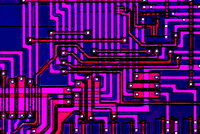Qualcomm Inc launches new convenient chip
Qualcomm Inc. solved the problem of incompatible cellular broadband technologies by launching a new chip that will make it easier to build laptops.

Currently, business-oriented laptops are generally available with chips for either AT&T Inc.'s, Verizon Wireless' or Sprint Nextel Corp.'s networks. AT&T's network uses a technology called HSPA, or High-Speed Packet Access, while Sprint and Verizon Wireless use EV-DO, or Evolution-Data Optimized.
Both network technologies are also being rolled out overseas, with HSDPA being the dominant choice.
Qualcomm's new Gobi chip can connect to either type of network, which should make it easier for laptop users to shop around for the carrier that has the best coverage and prices in their area.
The chips are available immediately, and Qualcomm expects them to appear in laptops in the second quarter of next year.
The chips may increase the choices for cellular broadband users, but those networks are competing not just with each other but with WiMax, another long-range wireless technology that promises higher data speeds on a network that's cheaper to build. Qualcomm's chip does not support WiMax.
In the U.S., Sprint is building a WiMax network, in alliance with Clearwire Corp., which already has a network in parts of the country.
Subscribe to Pravda.Ru Telegram channel, Facebook, RSS!


